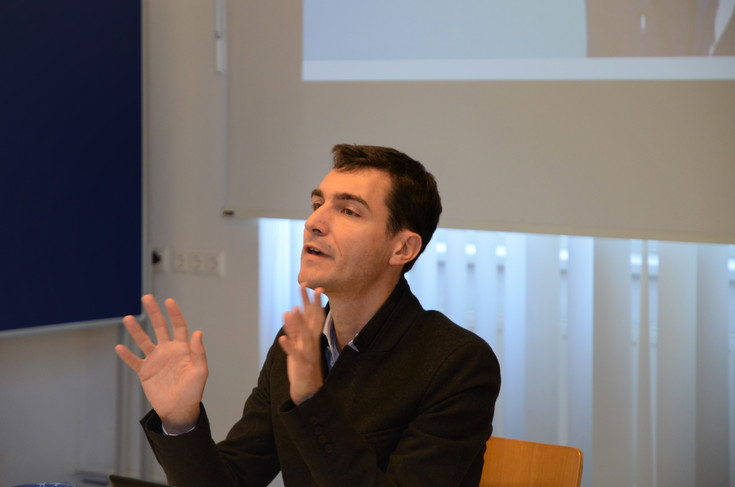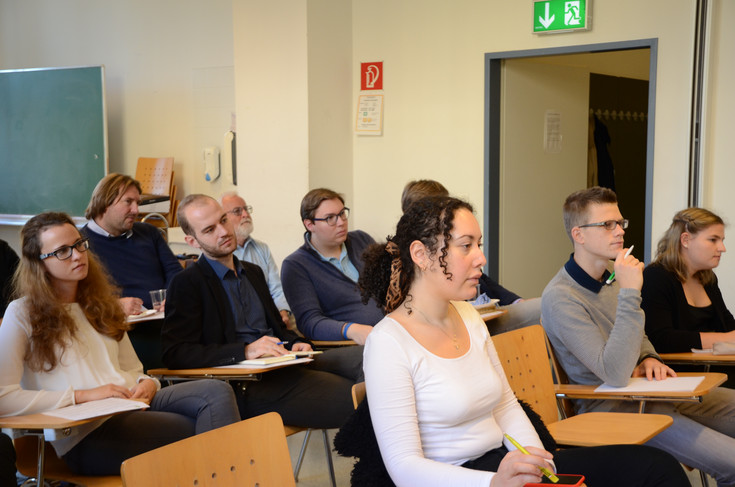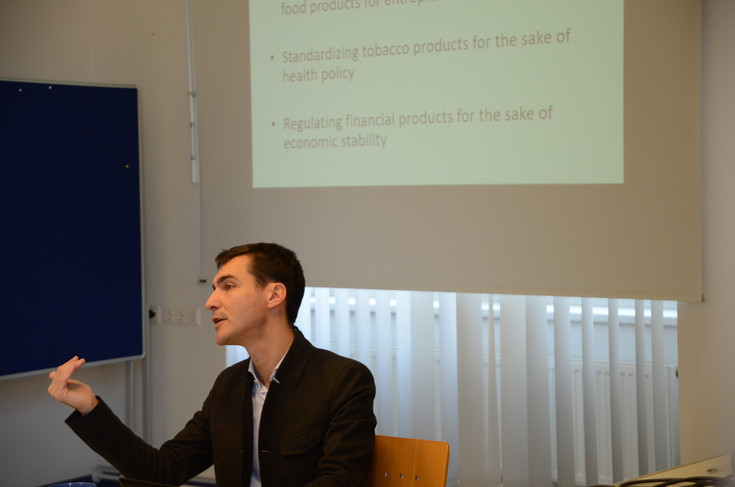European Objects: The troubled dreams of harmonization
25.10.2019
Over the last three years Brexit has been an unavoidable news item in the UK and beyond. As it touches on a seemingly endless myriad of issues, Brexit is also a suitable hook for the discussion of practically any topic. Accordingly, Boris Johnson, the acting UK Prime Minister, soon appeared on the slides projected behind Professor Brice Laurent, MINES ParisTech, during his LTS lecture at BOKU University. Pictured at the 2019 Conservative Party leadership race, Boris Johnson was holding a packaged herring in his right hand – a product referred to as a “kipper” in the UK – using it as an example for EU overregulation. Johnson’s accusation prompted a strong denial from the European Commission, whose spokesperson emphasized that while there were in fact various EU provisions applicable to fish products, the regulation referred to in Johnson’s speech was not one of them.
Objects, Politics and Law
Apart from being slightly odd, the “kipper-gate” is remarkable for being a controversy surrounding an object: the kipper is not only a packaged fish in a material sense, but also in a regulatory (i.e. legal) sense. The difficulty of conceiving of objects in this dual – factual as well as regulatory – understanding, points according to Professor Laurent “to the difficulty in considering technical/regulatory objects as political objects that matter”.
Beyond fish, many things matter for EU regulators: chemicals, financial products, food, etc. They matter because the regulation of these objects is deemed important for the proper functioning of the European Single Market, the raison d’être of most EU institutions. In regulating these objects, European regulators however also (re-)define them, thus creating what could be called “European objects”.
And, because these “European objects” are not merely factual but in large parts political, they invite closer examination of the ways they are defined by various formal or informal actors and subsequently regulated by EU legislators, as well as of the imaginaries these objects reveal: “Regulatory actions on European objects are attached to long-term perspectives of desirable European futures”, Professor Laurent stressed.
Dreams of a Disentangled Market
The European Single Market needs to be freed from the entanglements of member state’s national markets to fulfil its potential – at least that is arguably the EU’s view. EU institutions are therefore pursuing what Professor Laurent called the “dream of a disentangled market”. A way to disentangle the market is to disentangle the objects within it, i.e. to harmonise them. Harmonisation is not always unproblematic, however. To illustrate his point, Professor Laurent provided the examples of French Languedoc wine and Cypriot Halloumi cheese that had both gained protected geographical status in the EU. The protections meant that these products needed to be defined, and the definitions chosen by the EU ended up excluding some of the products of Languedoc wine producers and Cypriot cheese makers. The “local” was thus transformed into a “European local”.
Other attempts at disentangling the European market were undertaken in sectors such as energy (e.g. European Union Emission Trading Scheme), finance (e.g. banking union) or tobacco (e.g. health warnings).
Whether these individual attempts were successes or not is a discussion worth having, however the point being made by Professor Laurent went further. According to him, there are indications that harmonisation is a convenient way for EU institutions to extend their power beyond their original mandate: the most poignant example probably being that the EU arguably pursues health policy through harmonised regulation of tobacco products.
The Unique Voice of European Science
Professor Laurent also voiced concerns about similarly problematic tendencies in EU institutions to ground their legitimacy on claims of scientific objectivity. He explained that these tendencies become most evident during or in the aftermath of “crises”: The Fukushima nuclear disaster led to EU-managed nuclear risk and safety assessments (stress tests), while the financial crisis lead to an increase in the powers of the European Central Bank (ECB). On both occasions a large-scale political issue was turned into a problem of expertise to be evaluated and managed by a European epistemic authority, be it centralised like the ECB, or not.
From Failures of Harmonisation to Failures of Imagination
The dreams of harmonisation are not troubled because they aim at delegating more and more powers to EU institutions. They are troubled because the politics involved in the delegation seem too often to be side-lined and alternatives are neither publicly discussed nor made explicit. “The dream of a disentangled market and the dream of a unique voice of science are only painfully realised, and their alternatives are not articulated as consistent political projects”, Professor Laurent concluded. What seems crucial is not to prevent harmonisation but rather to find ways of imagining and articulating alternative harmonisation projects that could subsequently be subject to public debate and more transparent decision-making processes.
Daniel Romanchenko, November 2019
You can find the report in PDF-format here.
Artificial Intelligence in the Age of Terrorism: A Tipping Point for Constitutional Law
Artificial Intelligence in the Age of Terrorism: A Tipping Point for Constitutional Law
Speaker: Prof. Arianna Vedaschi, Bocconi University
Date: Wednesday, 13 December 2019
Time: 12:00 - 13:30
Place (changed due to the high number of registrations): Hörsaal VIII, 3rd Floor, Gregor Mendel-Straße 33, 1180 Wien (Gregor Mendel-Haus)
Participation is free of charge. Please register in advance until 11 December 2019 at: law(at)boku.ac.at
"The tension between human rights and security needs is at the core of counter-terrorism law. To what extent is it possible to limit rights in the name of national security? Is it feasible to guarantee security to people without violating the very essence of human rights or breaching the proportionality principle? These crucial questions, which have traditionally been a real conundrum for lawmakers, scholars and practitioners, become even trickier if one considers that the most advanced technologies, including artificial intelligence (AI) and machine learning (ML), are increasingly being used in the fight against terrorism.
My research addresses the challenges stemming from the application of AI and ML to counter-terrorism measures in a constitutional law perspective. On the one hand, I analyse human rights concerns related to the use of cutting-edge technologies in counter-terrorism measures. On the other hand, I try to envisage whether and how carrying on the fight against terrorism through AI implies a revision of well-established standards to which domestic and supranational courts resorted to in order to adjudicate terrorism cases and, ultimately, of the very understanding of constitutional principles and rights."
Arianna Vedaschi is Full Professor of Comparative Public Law at Bocconi University, Milan (Italy). Her field of research is counter-terrorism law, with a particular focus on the balance between security and human rights. She authored two monographs, Istitutioni europee e tecnica legislative (Giuffrè, 2001) and À la guerre comme à la guerre? La disciplina della guerra nel diritto costituzionale comparator (Giappichelli, 2007) and edited the book Secrecy, National Security and the Vindication of Constitutional Law (Elgar, 2013), together with D. Cole and F. Fabbrini. She published many articles on security-related issues in top law journals. Among recent publications, The Dark Side of Counter-Terrorism: Arcana Imperii and Salus Rei Publicae, in The American Journal of Comparative Law (2018).
Prof. Vedaschi is the Coordinator of the Research Group on Constitutional Responses to Terrorism, established within the International Association of Constitutional Law (IACL), and a member of the Europol Platform for Experts. She is also the Vice-Director of the law review Diritto pubblico comparato ed europeo as well as the Secretary-General of the National Association of Comparative Public Law (Diritto pubblico comparato ed europeo).
Bend until it breaks? On interactions between research evaluation, research conduct, and science-society relations
Bend until it breaks? On interactions between research evaluation, research conduct, and science-society relations
Speaker: Prof. Sarah de Rijcke, Leiden University
Date: Wednesday, 22 January 2020
Time: 12:00 - 13:30
Place: Seminar Room 20, Attic Floor, Peter-Jordan-Straße 65, 1190 Vienna (Oskar-Simony-Haus)
Participation is free of charge. Please register in advance until 20 January 2020 at: law(at)boku.ac.at
"In the past couple of decades, most European economies have dedicated significant resources to restructuring their science and innovation systems to meet global challenges. They have done so through concrete science policy interventions, including research evaluation and accountability dictates. Evaluation systems simultaneously reflect broader notions of the role of science in and for society, and affect and call on different scientific fields in different ways. In this talk I will share results from recent projects in which we analyzed interactions between evaluation and knowledge creation on the ‘shop-floor’ of academic research. I will also provide a ‘sneak preview’ into my new project FluidKnowledge: a multi-scale ethnography on how evaluation shapes ocean science."
Sarah de Rijcke is Professor of Science, Technology and Innovation Studies and Scientific Director at the Centre for Science and Technology Studies (CWTS), Leiden University. She specializes in social studies of research evaluation, which she considers in relation to epistemic cultures, knowledge infrastructures, valuation processes, and roles of research in and for society. She has developed a strong international public academic presence with outreach activities in science policy, speaking frequently on the topic of research evaluation and metrics uses. Sarah serves on the editorial boards of Science, Technology & Human Values (ST&HV), Palgrave Communications, and Science and Technology Studies. Her present research is funded by grants from the European Research Council (ERC), and from the The Netherlands Organisation for Health Research and Development (ZonMw). See also: www.sarahderijcke.nl








